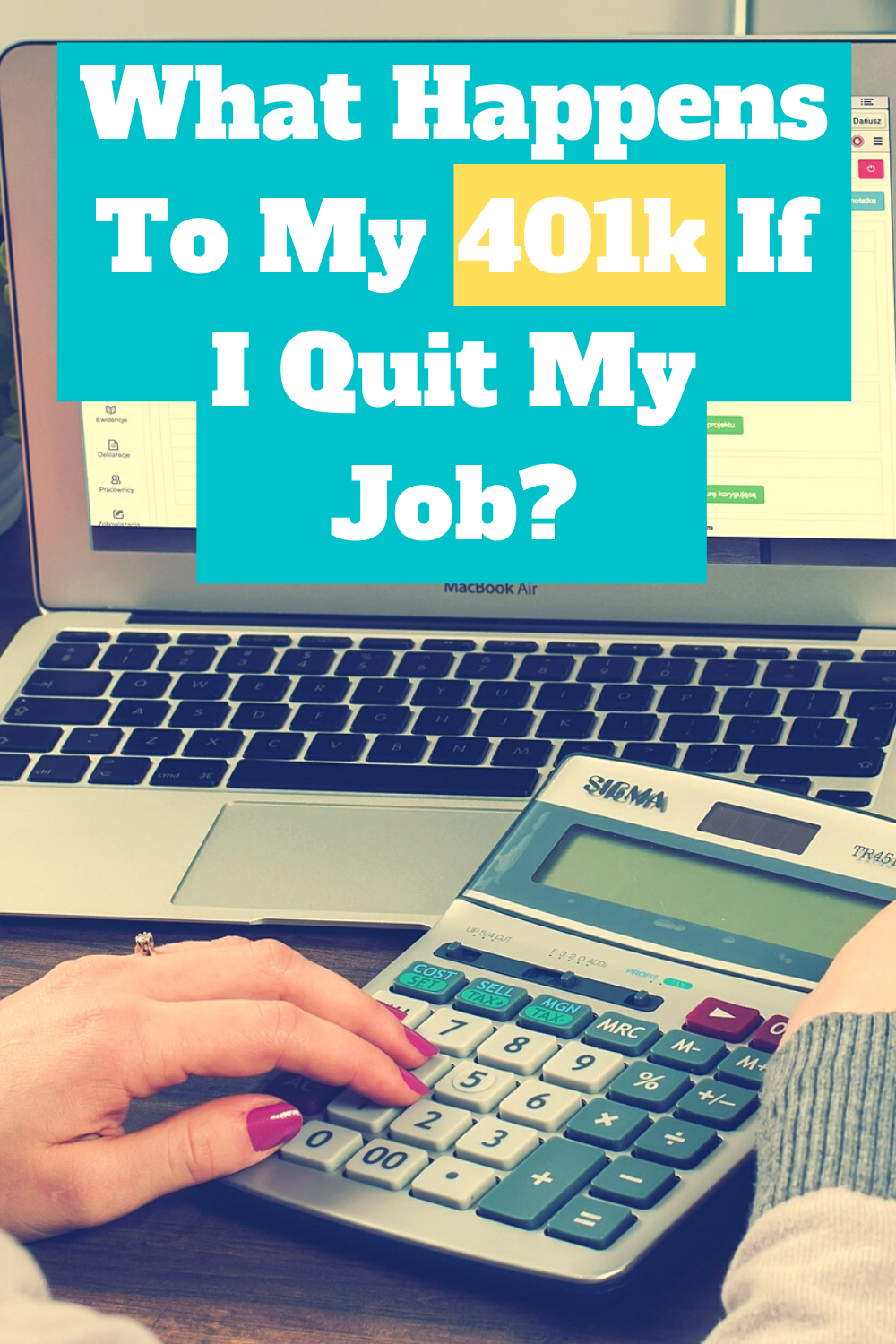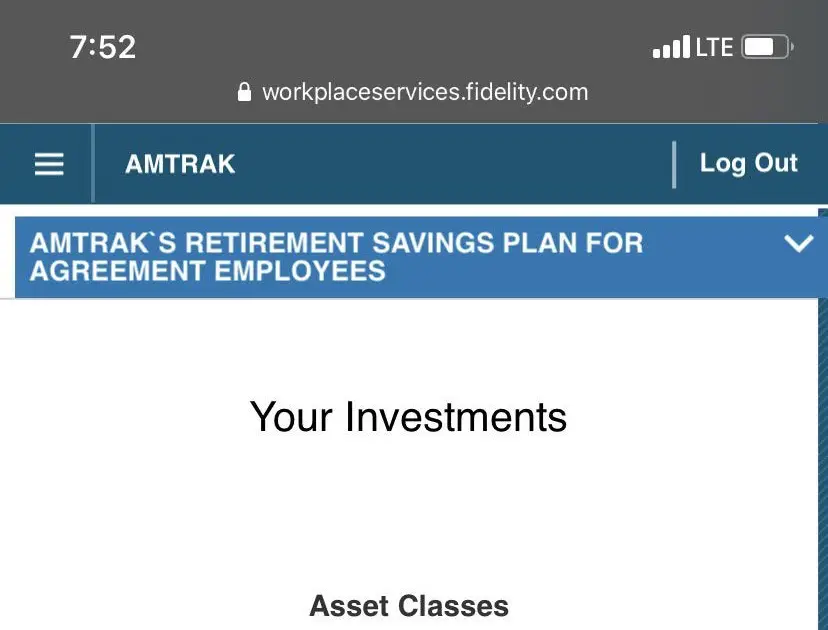What Happens To Your 401 When You Leave
Since your 401 is tied to your employer, when you quit your job, you wont be able to contribute to it anymore. But the money already in the account is still yours, and it can usually just stay put in that account for as long as you want with a couple of exceptions.
First, if you contributed less than $5,000 to your 401 while you were with that employer, theyre legally allowed to tell you, Your money doesnt have to go home, but you cant keep it here. . If you contributed less than $1,000, they might just mail you a check for that amount in which case you should deposit it into another retirement account ASAP so that you dont get hit with a penalty from the IRS . If you contributed between $1,000 and $5,000, your employer might move your money into an IRA, which is called an involuntary cashout.
Also, if you had a 401 match, then you only get to keep all of that money if the contributions had fully vested before you left. If not, your employer would get to take back any unvested contributions.
Letting Your Old Employer Send You The Money
When you roll over your 401 into your IRA or a new workplace plan, be sure to verify that the plan administrator is doing a direct rollover. That means they’ll send the check directly to your new financial institution, rather than to you.
If you do an indirect rollover, which means the check is made out to you, your old employer will have to automatically withhold 20% for taxes. On top of that, if you don’t reinvest the entire amount in a new retirement account within 60 days, you could face a 10% early withdrawal penalty, while also missing out on the tax-free growth that makes a 401 so appealing. To avoid any penalties, you’d need to come up with the 20% that was withheld so that you’re reinvesting your entire balance within 60 days.
A direct rollover is hands-down the way to go to avoid taxes, penalties, and unnecessary headaches for you.
Rollover The Money Into Your New Employers 401k Plan
If your new employer offers a 401k plan with low costs and a wide variety of investment options, this might be a viable option to consider. However, we generally recommend that people rollover their 401k plans into an IRA as they are usually lower cost and have more investment options, but more on that later.
If you are interested in rolling the money over into your new employers 401k, meet with the HR department or retirement plan custodian to find out more about your new companys plan, including whether you will be allowed to participate as soon as youre hired or will have to work for a certain number of days before youre eligible.
To accomplish this rollover, you will instruct the administrator of your former employers 401k to transfer your assets directly into your new employers plan once your account has been established. Alternatively, you can instruct the former employers 401k administrator to send you a check but you must deposit the funds into your new account within 60 days to avoid paying income taxes and a potential penalty on distribution.
You May Like: How Much Can I Put In My 401k Per Year
If You Have Taken A Loan
If you have an existing 401 loan, regardless of which of the above options you select when you quit your job, all outstanding 401 loan balances must be repaid, usually by the October of the following year, which is the deadline to file extended tax returns.
Any money not repaid is treated as an early withdrawal by the IRS, and you pay taxes on the amount, in addition to being hit with the early withdrawal penalty if you are younger than 59½.
What Is A 401 K

If you’re a member of the US workforce, you probably have a rough idea of what a 401 k account is. Many employers offers a 401 k. A 401 k is an account that part of your pay/income goes towards. A financial institution uses this money to invest. Once the investment is profitable, you get a share of the returns.
An 401 k account is subject to different taxes than a regular savings account. You can keep the money in such an account for years without paying taxes on it. The amount of time that the funds sit in your account isn’t important, though. It’s actually expected that the funds stay in your 401 k account until you reach retirement age.
Recommended Reading: How To Cash Out 401k After Leaving Job
What Happens To Your 401k When You Leave A Job
Unfortunately, many people choose not to make a decision about what to do with their 401k funds. Instead, they simply leave the funds behind in their former employers 401k plan. Most plans allow former employees to leave funds in their account if the account contains more than $5,000. If theres less than $5,000 in the account, the plan sponsor may issue the former employee a check in order to close out the account.
While leaving money behind in a former employers 401k might be the easiest thing to do, its not always the best option. People often fail to monitor accounts held at former employers as closely as they should the money becomes out of sight, out of mind. This problem can worsen if an individual ends up leaving money behind in several different former employers 401ks.
Also, the main benefit of a 401k plan is an employer match if the company offers one. Once you leave a job where you have a 401k, you no longer receive the match. And there are better investment vehicles out there 401k plans tend to have high fees, limited investment options, and strict withdrawal rules. So if youre no longer receiving the match, its usually best not to leave your assets languishing in an old 401k.
You Could Be Paying Outrageous Fees
On the surface, your old 401k plan might seem great. It may even include a lot of fancy bells-and-whistles. However, there is a very real possibility that your old employer threw in those bells-and-whistles without adding any real benefits. On top of that, your old employer could be using your money to pay for those. What do we mean by that? Well, every 401k is provided by some firm typically an insurance company or mainline brokerage firm and they can charge fairly hefty administrative fees, commissions, and service charges to maintain the plan. In most plans, those fees are being paid by the participants in some form of direct and indirect charges.
Read Also: How To Transfer 401k Without Penalty
How The Rollover Is Done Is Important Too
Whether you pick an IRA for your rollover or choose to go with your new employer’s plan, consider a direct rolloverthats when one financial institution sends a check directly to the other financial institution. The check would be made out to the bank or brokerage firm with instructions to roll the money into your IRA or 401.
The alternative, having a check made payable to you, is not a good option in this case. If the check is made payable directly to you, your employer is required by the IRS to withhold 20% for taxes. As if that wouldn’t be bad enoughyou only have 60 days from the time of a withdrawal to put the money back into a tax-advantaged account like a 401 or IRA. That means if you want the full value of your former account to stay in the tax-advantaged confines of a retirement account, you’d have to come up with the 20% that was withheld and put it into your new account.
If you’re not able to make up the 20%, not only will you lose the potential tax-free or tax-deferred growth on that money but you may also owe a 10% penalty if you’re under age 59½ because the IRS would consider the tax withholding an early withdrawal from your account. So, to make a long story short, do pay attention to the details when rolling over your 401.
Why You Can Trust Bankrate
Founded in 1976, Bankrate has a long track record of helping people make smart financial choices. Weve maintained this reputation for over four decades by demystifying the financial decision-making process and giving people confidence in which actions to take next.
Bankrate follows a strict editorial policy, so you can trust that were putting your interests first. All of our content is authored by highly qualified professionals and edited by subject matter experts, who ensure everything we publish is objective, accurate and trustworthy.
Our reporters and editors focus on the points consumers care about most how to save for retirement, understanding the types of accounts, how to choose investments and more so you can feel confident when planning for your future.
Read Also: What Is An Ira Account Vs 401k
Option : Transfer The Money From Your Old 401 Plan Into Your New Employers Plan
Moving your old 401 into your new employers qualified retirement plan is also an option when you change jobs. The new plan may have lower fees or investment options that better support your financial goals. Rolling over your old 401 into your new companys plan can also make it easier to track your retirement savings, since youll have everything in one place. Its worthwhile to talk with an Ameriprise advisor who will compare the investments and features of both plans.
Some things to think about if youre considering rolling over a 401 into a new employers plan:
Hardship Distributions From 401k Plan
If you are younger than 59 ½, youre going to have to demonstrate that you have an approved financial hardship to get money from your 401k account. And thats only if your employers retirement plan allows it. They are not required to offer hardship distributions, so the first step is to ask the Human Resources department if this is even possible.
If it is, the employer can choose which of the following IRS approved categories it will allow to qualify for hardship distribution:
- Certain medical expenses
- Certain expenses for repairs to a principal residence
The only other way to get access to your funds is to leave your employer.
You May Like: How Many Loans Can I Take From My 401k
Move Your 401 To Your New Employer
If your new employer has a retirement plan, you can ask your former employer to automatically transfer your money to the new 401. Direct transfers may take a few days or weeks, depending on the 401 plan.
You may also opt to receive a check with your 401 balance so that you can deposit it to your new 401. In this case, you have 60 days to deposit the check into the new plan. Any delays past the 60-day deadline attract an income tax and penalty on early withdrawals.
Option : Keep Your 401 With Your Old Employer

Many are surprised to learn that in certain circumstances, you can leave your 401 with your old companys retirement plan. However, if you have less than $5,000 in retirement savings, your company may force you out by issuing you a check. If they issue you a check, its crucial that you transfer the funds into a new 401 within 60 days, or else youll have to pay income tax on the distributed balance.
Leaving your retirement savings with your old employer has its drawbacks. For example, you wont be able to make any more contributions to the account, and you may also not be able to take out a loan on your 401. Your old employer may also charge administration fees on the account now that youre no longer an active participant. Additionally, youre still locked in to the funds that plan offers, which may be limited and expensive. For these reasons, many people particularly those new to the workforce choose to roll over their 401 to their new employer.
Recommended Reading: How Do I Transfer My 401k To A Roth Ira
If Youre Thinking Of Quitting Your Job
Timing is important here. If your company offers matching contributions, dont walk away and leave that money on the table. Check your plans vesting schedule to see whether working longer will let you vest more in your employer contributions. Also, find out when matching contributions are deposited into your account. Some companies make the deposit every pay period some only once a year. If you leave before that years contribution is made, youll lose it. *
Here Is What Happens To Your 401k If You Quit
The 401k plan is the dominate savings and investing account for many in the U.S., with around 54 million people participating as of 2015. As a result, many people wonder what happens to their 401k plan if they quit or leave their job. In the following article we will address this question and provide some links to follow to learn more about your possible options available to you for your 401k when you quit your job.
You may also be interested in 401k pros and cons.
Don’t Miss: How Do I Get My 401k
Because You Asked: How Long Does It Take To Cash Out 401k After Leaving Job
Not every job works out the way you might have hoped. Whatever your reason is for looking for a new employer, you’re probably wondering about cashing out your 401 k from your old job if you’re quitting before you reach retirement age. Depending on your individual retirement account, this may involve penalties.
This article discusses how long it might take for you to cash out your 401 k once you’ve left your job. It also goes over your possibilities for doing so and the different types of 401 k account you can have. If you don’t want to cash out the old account, you can generally transfer the money to a new 401 k plan or IRA account. It would help if you decided this based on any potential penalties and your investment options.
Start Making Qualified Distributions
If you meet the age requirement, you can begin making qualified distributions from your former employers 401k plan. While you wont be assessed a 10% penalty on these distributions, you will have to pay income taxes at your current ordinary income tax rate if the distributions are made from a traditional 401k.
Read Also: How To See How Much 401k You Have
You Can Keep Your Plan With Your Old Employer
The first thing you need to decide is what to do with the money in your old plan. Option one is simple: you can leave where it is, in your former employer’s plan.
The major advantage of leaving it there is that you don’t have to do anything and your account can stay where it is. The disadvantage is that you may be charged some of the fees that the company usually pays for but doesn’t cover for ex-employees.
Also worth considering here is whether you left your old job on good or bad terms.
Transfer Your 401 To Your New Employer
If you’re changing jobs and your new employer offers a 401, you don’t have to worry about what happens to 401 if you leave your job â you can create a new account and transfer your funds to it.
Your new employer 401 plan might be flexible and work well with your investment options and financial goals. Also, since it is easier to track your investment accounts when they are in one place, moving your money to your new 401 account can be a good option. 401-to-401 transfers are seamless and don’t include taxes or penalties.
Learn how to transfer your old 401 to your new one before you leave your job. If you receive your proceeds from your old employer via check or cash, a mandatory 20% tax is applied to the savings. If you fail to deposit the money to your new retirement account within 60 days, you are subject to penalties and taxes.
You May Like: Can I Transfer My Ira To My 401k
Your Roth 401 Options
A Roth 401 works like a traditional 401 plan in that contributions are made through paycheck deferrals and assets held within the plan are tax-deferred until they are withdrawn in retirement. However, a Roth 401 plan is a post-tax option contributions provide no upfront reduction to taxable income. Instead, Roth 401 contributions and earnings are tax-free when taken out after age 59½.
Once you leave your job with an employer offering a Roth 401 plan, you potentially have four options about what to do with your plan:
- You can maintain it as is with the plan sponsor.
- You can transfer it to a new employer plan.
- You can roll it over into an individual Roth IRA.
- You can take a lump-sum cash distribution.
Will I Have To Pay Taxes On My 401 Plan If I Quit My Job

Kirsten Rohrs Schmitt is an accomplished professional editor, writer, proofreader, and fact-checker. She has expertise in finance, investing, real estate, and world history. Throughout her career, she has written and edited content for numerous consumer magazines and websites, crafted resumes and social media content for business owners, and created collateral for academia and nonprofits. Kirsten is also the founder and director of Your Best Edit find her on LinkedIn and Facebook.
If you decide to leave the company that holds your 401 plan, you have four options for dealing with your funds. The tax consequences depend on which option you choose. However, if you have borrowed from your 401 and leave your job prior to repaying the loan, the rules are different.
Read Also: Should I Use My 401k To Pay Off Debt
